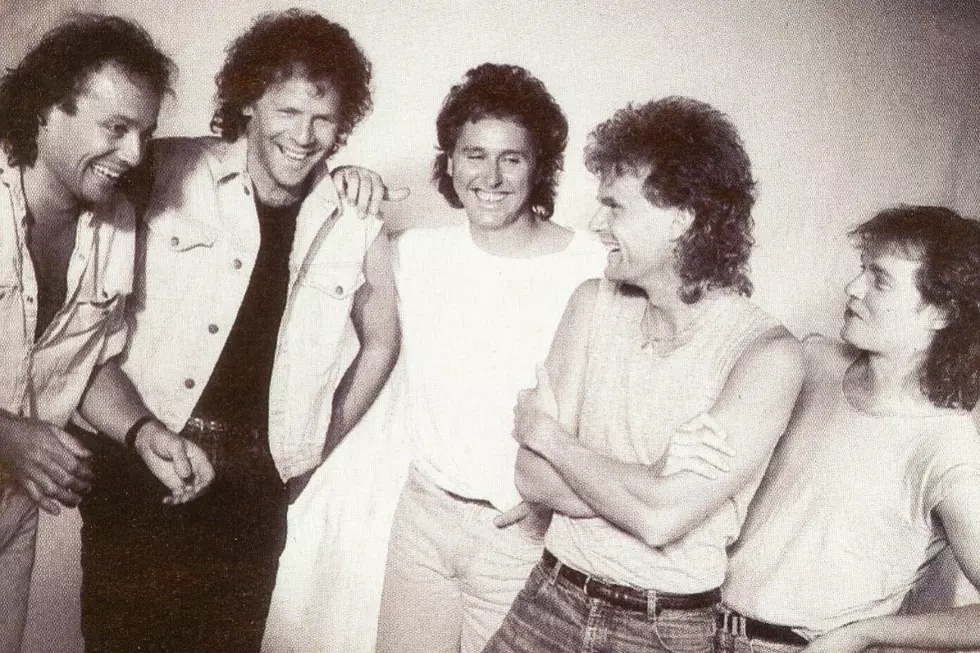
The Difficult Triumphs of Loverboy’s ‘Lovin’ Every Minute of It’
Loverboy perfected a multi-platinum formula with its first three albums, each of which cracked the Top 20 in the U.S. as well as the band's native Canada. With their fourth release, 1985's Lovin' Every Minute of It, they changed things up — albeit not always in ways they intended.
As singer Mike Reno and guitarist Paul Dean told UCR's Matt Wardlaw in a pair of exclusive interviews, Loverboy ended up hiring producer Tom Allom after working with Bruce Fairbairn on their first three records. But it wasn't necessarily because they wanted to make a change.
"We hired a different producer, just because our producer was busy," recalls Reno. "After we made him super-famous, he never had any time. He was booked constantly after the whole Loverboy stuff and so was our engineer, as it turned out. He was booked constantly too. So we ended up using a whole new crew and we brought them in from England. They had done Judas Priest albums and we liked the sound of them and we thought, 'We can probably go the same route, sound-wise.'"
Dean credits the band's selection of Allom to an interview he read with Billy Gibbons. "I heard him saying in an interview, it was two words. It wasn’t 'more cowbell’ as it is these days, it was 'more guitar,'" he explains. "I went, 'Yeah, yeah, more guitar!' So who is a great guitar producer? Tom Allom, of course."
Prior to heading into the studio with Allom, the band booked a series of sessions with Mike Shipley, who'd engineered a series of bestselling albums alongside producer "Mutt" Lange, but both Reno and Dean admit that neither they nor Shipley were prepared to deliver the album the band needed. "I know we were one song short of having a real complete album," Reno says now. "We cried out to our manager, 'Have you got any pull with anybody for songwriting? We need one more song.'"
Fortunately, adds Dean, Shipley was willing to make a crucial phone call. "In Mike Shipley’s wisdom, he said, 'You know, I love you guys and I love the tunes, but I don’t think there’s a single,'" he recalls. "So he called up Mutt and Mutt says, 'Okay, let me see what I can come up with.' So he wrote 'Lovin’ Every Minute of It' and like two or three days later, he literally phoned it in."
"There were no cellphones and there was no way to get the stuff here," continues Reno. "There was no magic email — that wasn’t even created yet. So what happened was that he held the phone up to the speakers, played the song from England and we recorded it from the telephone line by holding a little recorder up to the phone. We said 'thanks,' and then we hung up and we proceeded to pick this song apart and give it our best try from what we picked up off the phone. A lot of it probably wasn’t very well heard, so we had to make a lot of it up. That was kind of an interesting way of doing things, right?"
Listen to Loverboy Perform 'Lovin' Every Minute of It'
Lange's contribution wasn't the only song the band accepted from an outside writer. After half a decade of non-stop touring and churning out hit records, the members of the group co-wrote heavily for Lovin' Every Minute of It, and some tracks — most notably the Lange-penned title track and "Dangerous," a Bryan Adams/Jim Vallance co-write — were purely written for hire.
"It’s funny about record companies," admits Reno. "You become famous for a certain sound and a certain attitude and then you give them some new songs with the same attitude and they go, 'We want you to change it up a bit.' You know, it’s like asking James Patterson, the number one novelist in the world, to change it up a bit and write a cookbook or something, you know, because your adventures are getting a little bit [stale]. I never did understand why that happens."
Reno points out that Loverboy remained friends with some of the outside writers who wrote hits for the band, but adds that this situation inevitably diluted the strength of a sound that had been built on his songwriting partnership with Dean.
"A guy would come in and help finish off some of the lyrics and it would be a co-write with seven names on it," he sighs. "After that, I started kind of losing a bit of interest in the whole procedure. We kind of lost the intimacy of Paul and I coming up with all of these songs and everybody just loving them."
On the other hand, sometimes those co-writing sessions helped save songs that didn't seem to be going anywhere. One particular case in point during the Lovin' Every Minute of It sessions proved to be "This Could Be the Night," which stubbornly resisted completion until Journey keyboard player Jonathan Cain came in to add a fresh perspective.
"Paul and I had that song going on so many versions that I finally said, 'I can’t sing this song anymore,'" says Reno. "At one point, I just kind of threw my hands up and said, 'I’m going fishing — I’ve had enough of this,' and that’s when I think he took 'This Could Be the Night' and met Jonathan Cain, who we had toured with with Journey. Paul had a little bit more patience than I did."
Listen to Loverboy Perform 'Dangerous'
Aside from contributing a keyboard introduction bit that Dean calls "right out of the Journey songbook," Cain helped Dean pull together the song's structure — and forced him to dig deeper for the lyrics.
"I crashed at his house for a couple of days and we went into the studio and he said, 'What’s this about?' And I went, 'I don’t know,'" laughs Dean. "So we did some serious soul searching, because he wanted it to be heartfelt and true and honest. ... A lot of our tunes, like 'Turn Me Loose,' it was just make-believe and it was just like, 'Let’s imagine this scenario here — somebody’s probably going through this. Let’s make up a story.' Most of our tunes were like that. For this one, Jonathan, in his wisdom, insisted."
The songs didn't necessarily come easy for Lovin' Every Minute of It, but they were a piece of cake compared with the actual recording process, which became a technical nightmare after the band opted to record with new digital equipment that often proved to be more trouble than it was worth. "They brought these machines in and there were nothing but problems every day," laughs Reno. "It was like, 'Okay, we can’t record today — we’ve got to get the guy to come in from L.A. and realign these digital machines.' They were spitting out too much information and overloading. I didn’t even understand what the hell they were talking about, other than 'You’re not in the studio today. Plus, you’re paying for it.'"
"I had heard Donald Fagen’s Nightfly album, and I was blown away by the fidelity. To my knowledge, it was the first digital album ever recorded," recalls Dean. "You can’t imagine how cutting edge this was. This was going to be the first digital rock album ever. So we recorded all of the beds and then something happened to the tapes — they developed a bunch of glitches and pops and clicks. We had just recorded the whole friggin’ album, we just spent like two weeks and all of this money, and now it’s destroyed. We had the studio locked out in Vancouver and we’re paying for these machines weekly. The bills are just going through the roof."
"We had a horrible time with this new technology," adds Reno. "And as it turned out, as it was first being created, I don’t even think it really sounded that good, to be honest with you. They said it was supposed to, but to my ears, it sounded a little bit brittle and a bit synthetic. I never did like it."
"We were insane," Dean concurs. "It didn’t make a hoot of difference, I’m sure, in the end, but we were just fixated on it. 'It’s gotta be digital.'"
Listen to Loverboy Perform 'This Could Be the Night'
The Lovin' Every Minute of It sessions may have been more labor-intensive than anyone could have guessed going in, but Reno insists the mood in the studio was fairly positive overall, and he still has fond memories of working with Allom.
"He had a great sense of humor and he was very English and used to say things with a big tumbler of Scotch in his hand — he’d say, 'Change nothing, immediately!' Just funny little English things like that," says Reno. "That was a great time. We had already kind of established ourselves. We were kind of successful and we had a pretty good attitude for that record."
The album continued the group's successful streak, peaking at No. 13 in the U.S. and going double-platinum while spinning off a trio of hit singles that entered heavy rotation on the Top 40 as well as Billboard's Mainstream Rock chart. But like a lot of other rock bands of the era, Loverboy found themselves fighting off increased pressure to deliver power ballads — and coping with the backlash that came from recording them, as Reno learned firsthand the previous year when he cut "Almost Paradise," a hit duet with Ann Wilson for the Footloose soundtrack.
"Paul said, 'If we do this song, we’re going to be so ballad-heavy that the fans are going to turn on us and we’re going to be lightweights,'" recalls Reno, who says his decision to record "Almost Paradise" nearly split the band. "I knew it was in a movie, and I said, 'Listen, if nobody watches the movie, then it doesn’t matter and if people do watch the movie and it is great, then it will lift us all up. If it doesn’t, it will just go away. So who cares?'"
Dean ultimately came around to Reno's point of view, and Loverboy scored another soundtrack hit with "Heaven in Your Eyes," from Top Gun, in 1986. Still, the tide was turning for the band at radio. When they returned with their next album, 1987's Wildside, the platinum sales stopped. The group increasingly shifted its focus to touring over the following decades, save for the odd LP like Unfinished Business from 2014.
"Paul is a super-good friend and working bandmate. You know, he and I have always gotten along. We’ve never had any arguments bad enough to spoil anything," muses Reno. "There’s always things that could be better here and there, but overall, after all of these years, we’re still tight and we still talk to each other almost every day. That’s a pretty good team."
Top 100 '80s Rock Albums
More From Ultimate Classic Rock









